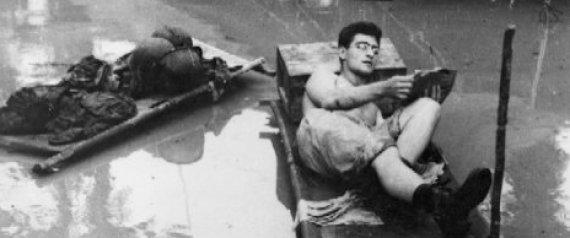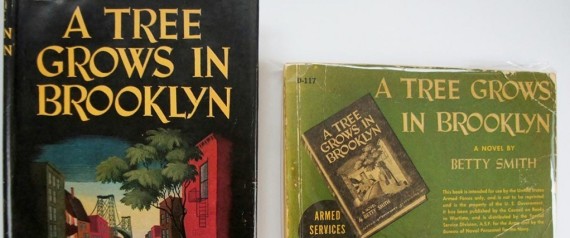"Were you ever so upset emotionally that you had to tell someone about it, to sit down and write it out?" a Marine wrote Betty Smith. "Ever since the first time I struggled through knee deep mud carrying a stretcher from which my buddie's life dripped away in precious blood and I was powerless to help him, I have felt hard and cynical against this world," he told her. But everything suddenly changed while he was in a hospital. He began reading a copy of A Tree Grows in Brooklyn.
"I can't explain the emotional reaction that took place in this dead heart of mine. . . . I only know that it happened," he told Smith. "A surge of confidence has swept through me and I feel that maybe a fellow has a fighting chance in this world after all," he said. After describing the incredible transformation he experienced, this Marine said in closing, "I don't think I would have been able to sleep this night, unless I had bared my heart to the person who caused it to live again."
Nothing could have prepared American GIs for what they faced during World War II. They transitioned from civilians to soldiers in a matter of months, leaving their homes to live in foxholes surrounded by the horrors of war. With blistered feet, mud-caked uniforms, and heavy packs, they marched in all weathers. To the cacophony of sniper fire, screaming mortars, and the crescendo of strafing airplanes, they advanced. Death was constantly lurking. In the midst of it all, soldiers needed something to make their lives bearable. They needed books.

In the finest hour in the history of American publishing, over 70 book companies came together to create a paperback designed for America's service members: the Armed Services Edition. Sized to fit inside the hip or breast pocket of a military uniform, these miniature books were carried into battle, hospitals, and enemy lands where books had been banned and burned. A staggering 123 million copies were printed and distributed for free. Westerns and mysteries, comics and humor, anthologies of poetry and short stories, histories and biographies, and even classics and contemporary fiction were deployed worldwide. These books were troops' ration on pleasure. Reading let the war fade from their minds, transporting their thoughts elsewhere. Books were often their only relief.
No author was better acquainted with the therapeutic effect of books than Betty Smith. When A Tree Grows in Brooklyn was printed as an Armed Services Edition, she received a flood of mail from appreciative GIs. On the surface, it was an unlikely book to win the hearts of young men. It told the coming of age story of a young girl, Francie Nolan, whose impoverished family scrapes by on her mother's wages from cleaning homes and occasional contributions from her beloved alcoholic father. Francie escapes her family's sufferings through books and her dreams of going to college. After her father's death, she is forced to leave high school to obtain work. Her dreams, however, could not be quashed. She persistently studies to pass her college entrance exams and eventually gains admission to a university.
Soldiers reading A Tree Grows in Brooklyn found hope for their own futures as they read of the tremendous adversity Francie had to overcome. They related to the tree that grew in Francie's yard that just would not die, as they, too, lived despite the odds that seemed stacked against them. The book also provided a precious reminder of their own families and hometowns.
Like the Marine who thanked Smith for making him feel alive again, thousands of other soldiers wrote heartfelt letters to Smith. One man said that A Tree Grows in Brooklyn was like reading "a good letter from home." Another man found a reason to fight when he felt like giving up. "You helped inspire me during some of my most trying days of battle, and battle fatigue [and] depression," he wrote to Smith. The book helped him focus on "the better things in life that I was fighting for." This man felt so indebted to Smith that he and his wife planned to name their first-born daughter Betty Smith, in honor of the author who helped him survive the war.
The book was a godsend in times of stress. While one unit was pinned down during a fierce shelling, a commanding colonel noticed one of his men was chuckling. The soldier hadn't lost his mind; he was reading A Tree Grows in Brooklyn. "He started reading us a portion" and the whole unit "laughed like hell between bursts. It sure was funny," the colonel told Smith.

Not only did books give the men something to laugh at when there was nothing funny about their circumstances, but they also eased daily irritations. For example, R.H. wrote to Smith, stating he was on the verge of punching his cheerful bunkmate, Gus, who had an annoying tendency to describe everything as "fine." But violence was no use. "I can see him now, picking himself up from the floor and laughing (not able to believe I'm really angry) and saying, 'Gee, that was a fine blow you floored me with, friend,'" R.H. complained. One day, Gus gave him a copy of A Tree Grows in Brooklyn, describing it as a "fine book." R.H. gritted his teeth but took the paperback. As he read, his irritation with Gus vanished. "I haven't the power to tell you, as I'd like, how it affected me," he said to Smith. "But I know this: from now on I won't be annoyed the least bit when Gus speaks of it and calls it fine."
Seventy years have passed since A Tree Grows in Brooklyn made the rounds during World War II. But the story of how books made a lasting impression on the millions of Americans who fought still resonates today. It is a testament to the power of books, and their incredible capacity to make our lives better.
Molly Guptill Manning is the author of When Books Went to War: The Stories that Helped Us Win World War II.
___________________
Also on The Huffington Post:
